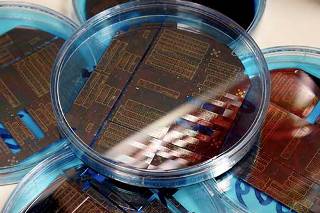Apr 20 2015
The University of Bristol has today launched its new state-of-the-art Quantum Engineering Technology (QET) Labs. The QET Labs will provide unique world-leading facilities, bringing together industrial and academic collaborators to build devices that span numerous areas of quantum technology development from the nano-fabrication of quantum devices to a city-scale Quantum Key Distribution network.
 Image of wafers for quantum processing
Image of wafers for quantum processing
With significant new investment from the University of Bristol, the QET Labs will span research groups across both the Faculties of Science and Engineering to deliver a radically new generation of machines that exploit quantum physics to transform our lives, society and economy.
Potential applications include developing secure communication systems for individuals, corporations and government; precision sensors for environmental monitoring, biomedical applications and security; quantum simulators to design new materials, pharmaceuticals and clean energy devices; and quantum computers to tackle challenges in big data and machine learning.
QET Labs was launched during the Bristol Quantum Information Technologies Workshop 2015, hosted by the Centre for Quantum Photonics (CQP) at the University of Bristol.
Speaking at the launch event from the deck of the SS Great Britain, Professor Jeremy O’Brien, Director of CQP said: “It seems fitting that we are standing here on Brunel's SS Great Britain, in sight of the Clifton Suspension Bridge, launching a new venture that pays homage to such great historical figures as Dirac and Brunel. The QET Labs brings their contributions to humanity together binding quantum physics with engineering technology.”
“QET Labs will be an international node for collaboration with industrial and academic world-leaders,” Professor Nishan Canagarajah, Pro-Vice-Chancellor for research, said.
QET Labs aims to be a global centre for research, development and entrepreneurship in the emerging quantum technology industry with world leading facilities and core expertise in photonic quantum technologies and quantum systems engineering. The Labs will house over 100 researchers working to deliver quantum technologies whilst supporting the training of future quantum engineers through the EPSRC Centre for Doctoral Training in Quantum Engineering.
The QET Labs development is well under way and will be fully complete and open for business in September.